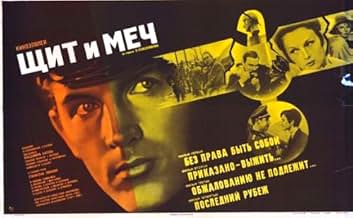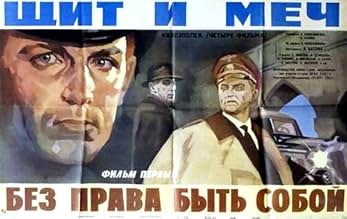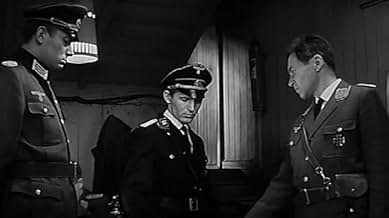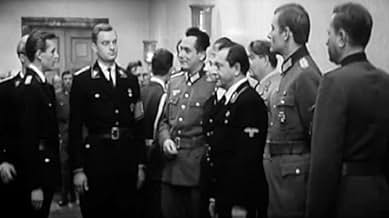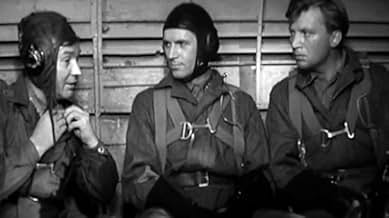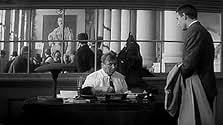Ajouter une intrigue dans votre langueThe title refers to the emblem of the Soviet NKVD. The story involves a spy who infiltrates the German SS during World War II.The title refers to the emblem of the Soviet NKVD. The story involves a spy who infiltrates the German SS during World War II.The title refers to the emblem of the Soviet NKVD. The story involves a spy who infiltrates the German SS during World War II.
Parcourir les épisodes
Avis à la une
Historical drama. The film adaptation of the novel of the same name by a Soviet writer and journalist (as well as a front-line correspondent and participant in the storming of Berlin) Vadim Mikhailovich Kozhevnikov. I have nothing to say for the book source (because I haven't read it), so I will evaluate the film adaptation as an independent work, especially since Vadim Mikhailovich was the author of the script here (together with director Vladimir Basov). I continue the marathon of Soviet film intelligence officers of the Great Patriotic War, and I could not pass by this legendary and popularly beloved picture, and I will even say a terrible thing - I gave the highest rating in absentia seven years ago. Yes, I understand, maybe it's too much, but the viewing confirmed such high confidence. And here's my brief opinion for you - Kai Johann Weiss fooled the fascists. I want to note right away that there was not a single flaw in the picture, there are only advantages, but there are several points that need to be highlighted in a separate paragraph. And with this, we will finish such an important introduction and get to the point.
So, the undeniable advantages: 1. Scenario - Soviet citizen Alexander Belov in 1940, on the instructions of the Soviet command, was introduced into the German Abwehr under the guise of a German repatriate Johann Weiss, where he must prove himself as an officer loyal to Germany and personally to the Fuhrer, and achieve a high rank in this organization in order to carry out responsible tasks of the Soviet command. There will be the throwing of defectors "loyal" to the Reich into the Soviet rear, and disinformation, and the recruitment of new agents surrounded by Weiss, and towards the end of the war - the breakdown of separate negotiations with Britain and the United States, and the prevention of the concealment of Fascist crimes on their own and still occupied territory. Johann Weiss reached the rank of SS Haupsturmfuhrer (captain (Oberst)), but had patrons and acquaintances in the Abwehr and SS, as well as the personal patronage of Reichsfuhrer Himmler, which allowed the hero to receive valuable information for the Soviet command and had the opportunity to perform important tasks. It should be said that the prototype of Johann was Alexander Panteleimonovich Svyatogorov (he worked in the temporarily occupied territory of the USSR, the General Government and occupied Slovakia, was the head of the operation to destroy Stepan Bandera and so on). Johann's service lasted for five long years, during which he had to "forget himself completely" in order to successfully infiltrate the fascist environment (although, sometimes, he allowed himself to show humanity). During this time, he was able not only to understand people (who were brainwashed by almost everyone), but also to hire valuable agents, and not to reveal himself to the main fascists almost to the very end, which requires cosmic endurance and well-developed empathy, plus a phenomenal memory and an unremarkable appearance, and allowed him to be useful to the Soviet Union all his life. The Great Patriotic War. There are many dramatic moments in the film that touch to tears, the crimes of fascists, hypocrisy and duplicity of the "patriots" of Germany (Angelica Bucher, Willy Schwarzkopf, Heinrich Himmler and so on) are shown (though not much). Our agents, with whom Johann was in contact and worked, are perfectly disclosed. And the finale is such an emotional shake-up that it takes the soul and does not let go for a long time. My respects!
2. The song "Where the motherland begins" is a great song by the composer Benjamin Basner and the author of the text Mikhail Matusovsky, performed by Mark Bernes, became very popular after the release of the picture and of course "went to the people". Simple words, soul-touching music and Stanislav Lyubshin's look in German form - and success on the face. And the idea of the song was suggested by Alexander Svyatogorov. Of course, I knew this song and heard it more than one hundred times, but I didn't know that it was from this picture. And in general, it is worth praising the musical accompaniment of the picture, because it is filled with German patriotic songs and marches, mixed with fascist marches, performances by Goebbels and Hitler.
3. Atmosphere - the picture was created by three countries: the USSR, the People's Republic of Poland and the GDR, and was shot mainly in the Kaliningrad region, Riga and on the territory of the GDR and the People's Republic of Poland, so you can't find fault with the environment, because everything looks very natural. Excellent musical accompaniment and gorgeous costumes only enhance the immersive effect of the viewer. Bravo!
4. Intelligence - the consultants of the picture chose Stanislav Lyubshin precisely because a good scout is an inconspicuous scout, this is not "James Bond", but this is a modest employee and an excellent analyst with an excellent memory, who scrupulously collects the necessary information, masterfully recruits agents and does not risk himself once again, so as not to disrupt the operation and not to ruin yourself and your people (as happened in Copenhagen in 1935) and there are thousands more nuances in this matter that simply cannot be disclosed to the general public. Throughout the war, Johann was opposed by both the Abwehr (a strong structure with experienced employees) and the RSHA (in 1944, the Abwehr was liquidated and some of the employees were transferred to this organization). It's not worth talking about the RSHA, because not only personnel employees serve there, but also fascist fanatics, so you have to behave appropriately there, otherwise there is a great risk of falling under suspicion and then only death will remain, and it's better to shoot yourself, otherwise monstrous tortures are waiting for you. Fascists are shown to be cruel, clever, cunning and insidious opponents who need to be beaten, because the price of this is hundreds of thousands, if not millions of lives. We defeated a strong opponent that no one could defeat before us, and this is the pure truth. Honor and glory to the soldiers and commanders of the Red Army and all those involved in this Great Victory!
5. Acting - Soviet theater school is not modern "stone or screeching faces." This is professionalism to the core. And what kind of selection for roles, and how textured they look, and such dialogues. Learn damn modern "directors"!
A little about the main characters: 1. Johann Weiss (Peter Kraus, Alexander Belov), played by Stanislav Lyubshin, is a Soviet intelligence officer embedded in the German Abwehr (and later in the RSHA), performing particularly important tasks of the Soviet command in Germany and in the occupied territory. He is honest, has ambitions, enters the highest circles of the state, has the patronage of Himmler himself. Stanislav Andreevich was great in this role. Bravo!
2. Gernich Schwarzkopf performed by Oleg Yankovsky is a friend of Johann, with whom he repatriated from Riga to Germany. Has a native uncle Willie, who spoils his nephew in every possible way. He even arranges it in the RSHA, which will play an important role in the future. A rake and a buffoon, who, nevertheless, appreciates the friendship with Johann and helps him in every possible way. And although Oleg Ivanovich has a secondary role here, he is very much remembered, mainly by the course of thoughts and unbridled behavior, which is rare in the environment where they are.
I will not list all the actors (and actresses) who took part in this film, otherwise the review will turn out in ten parts. Just know that each of them is worthy of a separate mention and each is remembered.
Now about some points. The script clearly did not contain all the events of the book, and this is evident from the beginning and end of each of the four parts. Sometimes years pass between parts, during which an important series of events occurred, sometimes some actions of the hero are not clear (for example, an attack on a mountain prison). Apparently you need to read a book so that everything becomes clear. But even so, the creators managed to shoot not just a decent movie, but a masterpiece that entered the golden classics of not only Soviet, but also world cinema, and which new generations of viewers continue to watch, admiring the heroes who defeated fascism.
My rating is 10 out of 10 and my recommendation for viewing!
So, the undeniable advantages: 1. Scenario - Soviet citizen Alexander Belov in 1940, on the instructions of the Soviet command, was introduced into the German Abwehr under the guise of a German repatriate Johann Weiss, where he must prove himself as an officer loyal to Germany and personally to the Fuhrer, and achieve a high rank in this organization in order to carry out responsible tasks of the Soviet command. There will be the throwing of defectors "loyal" to the Reich into the Soviet rear, and disinformation, and the recruitment of new agents surrounded by Weiss, and towards the end of the war - the breakdown of separate negotiations with Britain and the United States, and the prevention of the concealment of Fascist crimes on their own and still occupied territory. Johann Weiss reached the rank of SS Haupsturmfuhrer (captain (Oberst)), but had patrons and acquaintances in the Abwehr and SS, as well as the personal patronage of Reichsfuhrer Himmler, which allowed the hero to receive valuable information for the Soviet command and had the opportunity to perform important tasks. It should be said that the prototype of Johann was Alexander Panteleimonovich Svyatogorov (he worked in the temporarily occupied territory of the USSR, the General Government and occupied Slovakia, was the head of the operation to destroy Stepan Bandera and so on). Johann's service lasted for five long years, during which he had to "forget himself completely" in order to successfully infiltrate the fascist environment (although, sometimes, he allowed himself to show humanity). During this time, he was able not only to understand people (who were brainwashed by almost everyone), but also to hire valuable agents, and not to reveal himself to the main fascists almost to the very end, which requires cosmic endurance and well-developed empathy, plus a phenomenal memory and an unremarkable appearance, and allowed him to be useful to the Soviet Union all his life. The Great Patriotic War. There are many dramatic moments in the film that touch to tears, the crimes of fascists, hypocrisy and duplicity of the "patriots" of Germany (Angelica Bucher, Willy Schwarzkopf, Heinrich Himmler and so on) are shown (though not much). Our agents, with whom Johann was in contact and worked, are perfectly disclosed. And the finale is such an emotional shake-up that it takes the soul and does not let go for a long time. My respects!
2. The song "Where the motherland begins" is a great song by the composer Benjamin Basner and the author of the text Mikhail Matusovsky, performed by Mark Bernes, became very popular after the release of the picture and of course "went to the people". Simple words, soul-touching music and Stanislav Lyubshin's look in German form - and success on the face. And the idea of the song was suggested by Alexander Svyatogorov. Of course, I knew this song and heard it more than one hundred times, but I didn't know that it was from this picture. And in general, it is worth praising the musical accompaniment of the picture, because it is filled with German patriotic songs and marches, mixed with fascist marches, performances by Goebbels and Hitler.
3. Atmosphere - the picture was created by three countries: the USSR, the People's Republic of Poland and the GDR, and was shot mainly in the Kaliningrad region, Riga and on the territory of the GDR and the People's Republic of Poland, so you can't find fault with the environment, because everything looks very natural. Excellent musical accompaniment and gorgeous costumes only enhance the immersive effect of the viewer. Bravo!
4. Intelligence - the consultants of the picture chose Stanislav Lyubshin precisely because a good scout is an inconspicuous scout, this is not "James Bond", but this is a modest employee and an excellent analyst with an excellent memory, who scrupulously collects the necessary information, masterfully recruits agents and does not risk himself once again, so as not to disrupt the operation and not to ruin yourself and your people (as happened in Copenhagen in 1935) and there are thousands more nuances in this matter that simply cannot be disclosed to the general public. Throughout the war, Johann was opposed by both the Abwehr (a strong structure with experienced employees) and the RSHA (in 1944, the Abwehr was liquidated and some of the employees were transferred to this organization). It's not worth talking about the RSHA, because not only personnel employees serve there, but also fascist fanatics, so you have to behave appropriately there, otherwise there is a great risk of falling under suspicion and then only death will remain, and it's better to shoot yourself, otherwise monstrous tortures are waiting for you. Fascists are shown to be cruel, clever, cunning and insidious opponents who need to be beaten, because the price of this is hundreds of thousands, if not millions of lives. We defeated a strong opponent that no one could defeat before us, and this is the pure truth. Honor and glory to the soldiers and commanders of the Red Army and all those involved in this Great Victory!
5. Acting - Soviet theater school is not modern "stone or screeching faces." This is professionalism to the core. And what kind of selection for roles, and how textured they look, and such dialogues. Learn damn modern "directors"!
A little about the main characters: 1. Johann Weiss (Peter Kraus, Alexander Belov), played by Stanislav Lyubshin, is a Soviet intelligence officer embedded in the German Abwehr (and later in the RSHA), performing particularly important tasks of the Soviet command in Germany and in the occupied territory. He is honest, has ambitions, enters the highest circles of the state, has the patronage of Himmler himself. Stanislav Andreevich was great in this role. Bravo!
2. Gernich Schwarzkopf performed by Oleg Yankovsky is a friend of Johann, with whom he repatriated from Riga to Germany. Has a native uncle Willie, who spoils his nephew in every possible way. He even arranges it in the RSHA, which will play an important role in the future. A rake and a buffoon, who, nevertheless, appreciates the friendship with Johann and helps him in every possible way. And although Oleg Ivanovich has a secondary role here, he is very much remembered, mainly by the course of thoughts and unbridled behavior, which is rare in the environment where they are.
I will not list all the actors (and actresses) who took part in this film, otherwise the review will turn out in ten parts. Just know that each of them is worthy of a separate mention and each is remembered.
Now about some points. The script clearly did not contain all the events of the book, and this is evident from the beginning and end of each of the four parts. Sometimes years pass between parts, during which an important series of events occurred, sometimes some actions of the hero are not clear (for example, an attack on a mountain prison). Apparently you need to read a book so that everything becomes clear. But even so, the creators managed to shoot not just a decent movie, but a masterpiece that entered the golden classics of not only Soviet, but also world cinema, and which new generations of viewers continue to watch, admiring the heroes who defeated fascism.
My rating is 10 out of 10 and my recommendation for viewing!
This is another film about Soviet services of intelligence in nazi Germany. This time the hero of the film is an agent infiltrated by the Soviets in the Baltic countries already occupied by nazis. Although the film was made unreasonably black and white it showed masterfully how the agent was able to introduce himself in high positions of German army. He could also monitor any movement harmful to the position of the Red Army at the time of its offensive by 1944. Instead of having a serial of action as usual in American-made films, the film catch you from the very beginning as a nearly realistic thriller. No less amazing is the end when the Soviet troops entered in Berlin and the hero tried to make free several prisoners.
Le saviez-vous
- AnecdotesIt is this film that inspired the young Vladimir Putin to apply for a job with the KGB.
- Citations
Heinrich Schwarzkopf: [sadly, to Weiss/Belov, who is holding a hidden pistol] You would have killed your old friend...
- ConnexionsFeatured in Legendy kino: Vladimir Basov (2016)
- Bandes originalesMakhnyom ne glyadya
Music by Venyamin Basner
Lyrics by Mikhail Matusovsky
Performed by Pavel Kravetskiy
Meilleurs choix
Connectez-vous pour évaluer et suivre la liste de favoris afin de recevoir des recommandations personnalisées
- How many episodes does The Shield and the Sword have?Alimenté par Alexa
Détails
- Date de sortie
- Pays d’origine
- Site officiel
- Langue
- Aussi connu sous le nom de
- Shchit I Mech: Film 2
- Lieux de tournage
- Sociétés de production
- Voir plus de crédits d'entreprise sur IMDbPro
- Mixage
Contribuer à cette page
Suggérer une modification ou ajouter du contenu manquant

Lacune principale
By what name was Shchit i mech (1968) officially released in Canada in English?
Répondre
